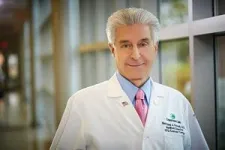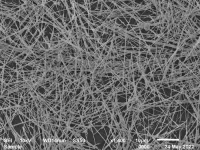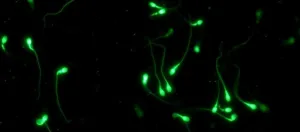(Press-News.org) Fidel Santamaria, a professor in the UTSA College of Sciences’ neuroscience, developmental and regenerative biology department, received a $2 million grant through the National Science Foundation’s Emerging Frontiers in Research and Innovation (EFRI) program to develop new artificial intelligence (AI) applications in the most energy-efficient manner yet.
For machine-learning tools to analyze new data, they must first sort data into various categories. For example, if a tool is sorting photos by color, then it needs to recognize which photos are red, yellow or blue to accurately classify them. While this is an easy chore for a human, the task presents a complicated and energy-hungry job for a machine.
“We want really powerful AI, but to train that AI requires a lot of energy. That’s a national challenge. That’s the challenge of AI,” Santamaria said. “We, as humans, have a good abstraction processing of information with very, very little energy consumption compared to computers. On top of that, we are very flexible in learning. We can process things and use history to retrofit or use as feedback. We’re history dependent.”
Santamaria is collaborating with University of Tennessee Knoxville Professor Stephen Sarles, Portland State University Professor Christof Teuscher, and University of South Carolina Professor Yuriy V. Pershin. The research team is combining their work in biology, physics, computer science, and engineering to test the least energy-hungry electronic models.
One objective of neuroscience is to build better computers by modeling them from the function of the brain. In this project, the research team will use a mathematical theory that explains how real neurons adapt their responses based on their previous activity and apply it to design electric circuits that are both computationally and energetically efficient.
Neuromorphic computing—computer engineering modeled after systems in the human brain—relies on the connectivity between neurons that are identical. But Santamaria says this cannot be further from the biological reality of neurons.
“A single neuron can change because it’s history dependent. It can react differently on its own with no signal from other neurons. That adaptation is history dependence, which is a computational property that has been overlooked, and it underlines efficient computation,” explained Santamaria.
From biological observations, a series of equations called fractional order differential equations can be written. These equations are the natural mathematical language describing history dependent processes, and they explain how neurons behave.
“All the electronics we are using right now are based on resistors. Instead, math told us that if we can find a capacitor—a device for storing electrical energy—that is history dependent; then, we will be able to translate what we know from neuroscience to actually build a circuit that will have the same properties of the real neurons we have been investigating,” Santamaria said.
While resistors limit current flow, capacitors store energy in an electric field until it’s needed. The team will focus on building small circuits with capacitors that mimic biology. These capacitors will then link from a single model to a neural network allowing the team to study how they can train and challenge the creation of an AI application that is as good as or better than current AI but 100 times more energy-efficient.
“That will be disruptive if we are successful. There is not enough energy in the planet to train AI all day the way we want,” Santamaria said. “Everybody’s looking for energy efficiency. But they’ve been looking at it from an algorithmic point of view, coding or traditional neuromorphic approaches, and those approaches are still using the same hardware that is kind of more resistant based.”
He added, “We’re saying we need to change the computation, and we also need the physical hardware to be different in order to implement actual abstract neuronal behavior that right now no one is using because the physics of their materials don’t allow that.”
In addition to the research, the grant will also support four years of training for students and the development of workshops with leading philosophers and bioethicists in the field working on these types of AI applications.
“These technologies, if successful, will be transformative in how we build and use things and the NSF is very interested in trying to understand the ethical consequences of that. For that reason, we have an exciting collaboration with a philosopher here at UTSA, Christopher Stratman, on bioethics,” Santamaria said.
Stratman will be launching ethical and philosophical studies of the effects of AI adoption, which will include the design and implementation of professional workshops and embedded ethics modules in both undergraduate and graduate STEM courses.
“How can we make better science? That requires a philosopher and scientist together, working together. It’s important to have both out there and be a fundamental part of the training of students. And we’re actually going to do that,” Santamaria said.
END
UTSA researchers develop energy-efficient AI with $2 million NSF grant
2023-11-01
ELSE PRESS RELEASES FROM THIS DATE:
The secret to enhancing consumer valuation and addressing the climate crisis at once: introduce circular take-back programs
2023-11-01
Researchers from Boston University published a Journal of Marketing study showing that tapping into consumers’ sense of ownership prompts them to place a higher value on products from a circular economy.
The study, forthcoming in the Journal of Marketing, is titled “Affording Disposal Control: The Effect of Circular Take-Back Programs on Psychological Ownership and Valuation” and is authored by Anna Tari and Remi Trudel.
Governments worldwide view a circular economy as part of the solution to the climate crisis. In the U.S., several states such as California, Connecticut, Maine, Oregon, and ...
Plastic-eating bacteria turn waste into useful starting materials for other products
2023-11-01
Mountains of used plastic bottles get thrown away every day, but microbes could potentially tackle this problem. Now, researchers in ACS Central Science report that they’ve developed a plastic-eating E. coli that can efficiently turn polyethylene terephthalate (PET) waste into adipic acid, which is used to make nylon materials, drugs and fragrances.
Previously, a team of researchers including Stephen Wallace engineered a strain of E. coli to transform the main component in old PET bottles, terephthalic acid, into something tastier and ...
Younger Middle Eastern patients with new acute coronary syndrome more likely to smoke, have high cholesterol
2023-11-01
Young patients from the Middle East and Gulf region presenting with acute coronary syndrome have a greater prevalence of risk factors, including smoking and high cholesterol compared to older patients also presenting with first acute coronary syndrome. The study, presented at the American College of Cardiology Middle East & Eastern Mediterranean 2023 conference, found these patients still had similar outcomes compared to older patients.
Acute coronary syndrome (ACS) describes a variety of cardiovascular conditions related to sudden reduction in blood flow to the heart, including heart attack and unstable angina ...
Reducing breast cancer disparities in Delaware: 'Getting the village back together'
2023-11-01
There’s a tried and proven pathway to reducing racial disparities in cancer in Delaware. It worked with colon cancer 10 years ago and should now be applied to the incidence of breast cancer in the state. That's the recommendation of clinicians, program leaders and researchers from the ChristianaCare Helen F. Graham Cancer Center & Research Institute in a new commentary published in Population Health Management on Nov. 1, 2023.
The commentary — "Reducing Racial Disparities in Breast Cancer: Getting the ...
New research links high salt consumption to risk of Type 2 diabetes
2023-11-01
Those at risk for Type 2 diabetes may already know to avoid sugar, but new research suggests they may want to skip the salt as well.
A new study from Tulane University published in Mayo Clinic Proceedings found that frequently adding salt to foods was associated with an increased risk of developing Type 2 diabetes.
The study surveyed more than 400,000 adults registered in the UK Biobank about their salt intake. Over a median of 11.8 years of follow-up, more than 13,000 cases of Type 2 diabetes developed among participants. Compared ...
New resource gives business leaders a blueprint for optimizing equitable employee health and well-being
2023-11-01
DALLAS, November 1, 2023 — Health outcomes research has shown that workers in the U.S. experience inequitable health and well-being, with significant variations in the burden of chronic disease, mental health conditions, food insecurity and more across populations, even among those covered by employer-sponsored insurance.[1], [2] Recent studies demonstrate how the workplace can serve as a social driver of health, impacting the risk of conditions such as high blood pressure and heart disease.[3], [4] This growing ...
Nanowire ‘brain’ network learns and remembers ‘on the fly’
2023-11-01
For the first time, a physical neural network has successfully been shown to learn and remember ‘on the fly’, in a way inspired by and similar to how the brain’s neurons work.
The result opens a pathway for developing efficient and low-energy machine intelligence for more complex, real-world learning and memory tasks.
Published today in Nature Communications, the research is a collaboration between scientists at the University of Sydney and University of California at Los Angeles.
Lead ...
Epigenetic signature for obesity found in study of twins
2023-11-01
PULLMAN, Wash. – A susceptibility to gain weight may be written into molecular processes of human cells, a Washington State University study indicates.
The proof-of-concept study with a set of 22 twins found an epigenetic signature in buccal or cheek cells appearing only for the twins who were obese compared to their thinner siblings. With more research, the findings could lead to a simple cheek swab test for an obesity biomarker and enable earlier prevention methods for a condition that effects 50% of U.S. adults, the researchers said.
“Obesity appears to be more complex than simple consumption of food. Our work indicates there’s a susceptibility for this disease ...
Mobile phone use may affect semen quality
2023-11-01
Does electromagnetic radiation emitted by mobile phones affect semen quality? While various environmental and lifestyle factors have been proposed to explain the decline in semen quality observed over the last fifty years, the role of mobile phones has yet to be demonstrated. A team from the University of Geneva (UNIGE), in collaboration with the Swiss Tropical and Public Health Institute (Swiss TPH), has published a major cross-sectional study on the subject. It shows that frequent use of mobile phones is associated with a lower sperm concentration and total sperm count. However, researchers did not ...
Study finds JAK inhibitors, common treatment for arthritis, are effective
2023-11-01
According to a new paper in Rheumatology, published by Oxford University Press, JAK inhibitors, which doctors have used to treat patients with arthritis despite concerns about the effectiveness of such drugs, actually do work quite well. In a multicenter, retrospective study Japanese researchers found that the drugs resulted in impressive remission rates in patients, most of whom choose to continue such treatment.
Rheumatoid arthritis is a common autoimmune disease characterized by chronic inflammation of joint linings and results in progressive joint destruction and other systemic ...






